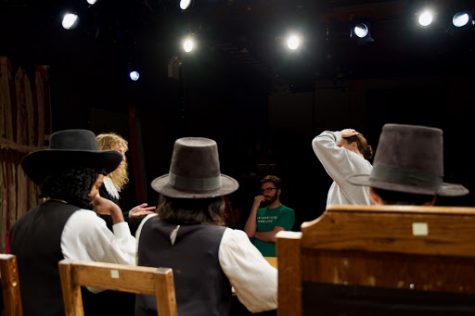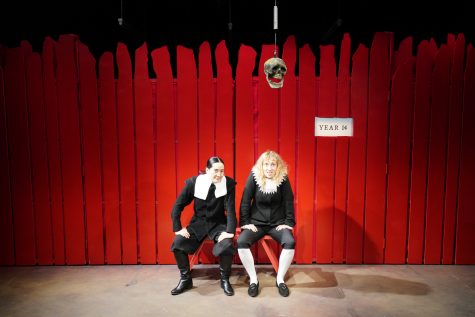Daniel Glenn takes on the big apple
A deeper look into his most recent play “King Philip’s Head”
November 7, 2019
American history can often be dull, boring and is avoided by most. But what if you were to take a classic American war-story and flip it on its head? Daniel Glenn did just that in his most recently debuted play, “King Philip’s Head is Still on That Pike Just Down the Road.”
The play follows a committee of pilgrims trying to decide when to take King Philip’s head off a pike following King Philip’s War, fought between New English colonial settlers and indigenous peoples. When King Philip, the Native American leader, was killed at the en d of the war, they cut off his head and put it on a long spike outside of Plymouth Colony.
To this day, no one knows what happened to the head. Most historians say that the head stayed up for decades and then eventually rotted away, and some believe that it was stolen. But at the end of the day, the head’s inevitable fate remains a mystery.
Before “King Philip’s Head,” Glenn had been playwriting for a little over 10 years. In addition to this play, he has written around 6 full-length plays, all of which have been performed in front of an audience. Not to mention the dozens of one-acts and 10 minute plays he has produced as well.
The cast consists of seven women playing men and one man playing five women. Glenn believed it would be unbearable to watch seven men shouting at each other about politics, and there is also an element of humor in the irony of women pretending to be men.
His main reason, however, is that both the play and the war deal with opposites: “us versus them,” essentially.
By casting a woman to play a man, the viewer is actively seeing two things at once: the woman as the actress and the man as the character. It amplifies the contrast between men and women within politics, and it allows you to think more about gender in the context of argumentation and disagreement.
Glenn’s inspiration came from Dee Brown’s Bury My Heart at Wounded Knee, which tells the story of the Native American struggle in the 19th century.
“I was only a few pages into it when he makes reference to this head being on this pike for almost 20 years,” Glenn said. “I needed to know more about that… because I thought It had relevance to our current cultural and political moment.”
He explained how we, as a society, are extremely divided. We are carrying grudges and spite around for people who think differently than we do.
“It feels almost impossible to see a way to a future where we don’t feel this way,” said Glenn. “I think we’re all sort of speaking apocalyptically these days, and we’ll never truly reconcile with the 48 percent of the country who think differently than we do.”
His play tackles this idea of coming together for a common goal, and it investigates the possibilities of moving forward. Because there are no real answers to these questions, Glenn’s hope was that the characters would point toward a satisfying ending.
He described the process of starting the play as quite unusual compared to others. It began with an idea that just happened to fit the criteria for a local contest held by the production company, Clubbed Thumb. He ended up being selected along with 4 other writers, who were all awarded a sum of money to help finish their plays.
“This is like the biggest break that I’ve ever had, so I was determined to write a play that they could not refuse.”
Glenn went off to a cabin for a week during spring break of 2018, and he did not let himself leave until he had the first draft. After that, he met with his team and they had two workshops over the course of the 2018-2019 school year. It wasn’t until the spring of 2019 that the production company told Glenn that they would produce it. 
The weeks following consisted of intense, 6-hour practices every day with the cast and crew, until opening night on June 19.
“My role during this whole process was essentially chief explainer,” said Glenn. He would go in with the draft, explain things, and when he realized that some things were not working, he would go back, rewrite, and come with new pages, then continue the same process.
He described his role as being in an academic class, but it’s not over after 50 minutes. “Imagine if that academic class lasted for six hours and you were the only person who got called on for every answer… It feels like your brain’s at the dentist – and that feeling when they pick at your teeth – that’s how your brain feels.”
Although this process was extremely difficult, Glenn described it as “a great blessing.” The benefit, he said, is you get to make everybody pay attention to your ideas, which is a real privilege.
There are drawbacks, however. To be a playwright, you must be prepared to “explain yourself for four weeks, six hours a day, and then at the end of the day, some theater critic comes in and tells you whether or not you did it well, which can be devastating.”
Glenn now has a literary agent who has sent the play to a number of different theatre companies and contests in hopes that someone will pick it up. It will not be until next spring, he speculates, until he will know what the future will look like for “King Philip’s Head.” However, because the New York Times wrote a great review, it is possible that you will see “King Phillip’s Head” in your city someday soon.
For any aspiring writers, Glenn’s advice is to write plays. Not only because he believes they are easier, but because you get immediate feedback on your writing from the actors and eventually the audience. “You may think something is funny, and you can think that all day, but the audience isn’t laughing,” said Glenn. He describes it as “trial by fire, in a way.”
As of now, our beloved Mr. Glenn remains within the Mount Pisgah walls, but who knows, maybe one of his plays will end up on Broadway someday.

